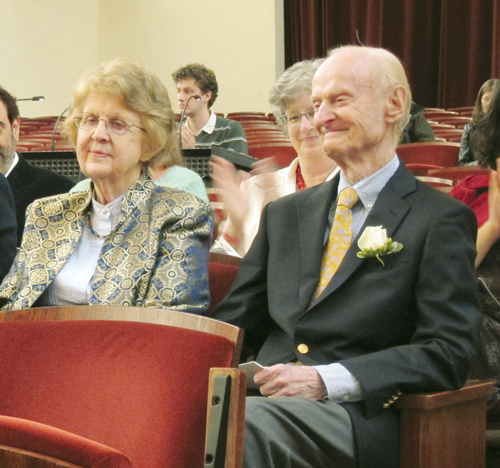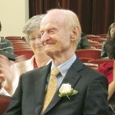
Former students of Robert Willoughby, who taught at the Oberlin Conservatory of Music for thirty-seven years, traveled from far and wide to present a concert honoring his ninetieth birthday on Saturday, October 15 in Warner Concert Hall at Oberlin. This remarkable man, who has received The National Flute Association’s Lifetime Achievement Award and who the British Flute Society’s journal calls the “American grandmaster of the flute,” has cast an indelible imprint on the flute world through his performing and teaching.
Willoughby represents the best tradition of American flute playing, having studied with Joseph Mariano at Eastman, Georges Laurent at the New England Conservatory, and William Kincaid in summers. He was assistant principal flute in the Cleveland Orchestra from 1946 to 1955 and principal flute of the Cincinnati Symphony for the 1959-1960 season. He was a founding member of the Oberlin Baroque Ensemble and teacher at Oberlin’s Baroque Performance Institute. One of the first Americans to pick up the Baroque flute in the early 1970s, he built a world-class collection of early flutes, including some that have served as models for present-day makers.
In addition to his long career at Oberlin, Willoughby taught at the Peabody Institute in Baltimore and at the Longy School of Music in Boston. His students play in nearly every major orchestra in the United States and teach at universities throughout the world. They all remember his high standards and fast pace, sense of humor, love of life, good taste, and insistence that musicianship trumps technical display.
The key to his teaching success is that he encourages students to think as he asks probing questions. The result is that his students achieve independence. There is no single Willoughby style or tone.
A lesson with Willoughby is never a dry rendition of technical exercises; instead, every moment is infused with musicianship. He approaches etudes as music, discussing phrasing, style, and expression. He upholds high standards of repertoire and enjoys a wide range of music, above all, Bach, Handel, French Baroque pieces, Gaubert, and contemporary music. He has no use for pieces without substance and is often impatient with contemporary works that go on too long.






